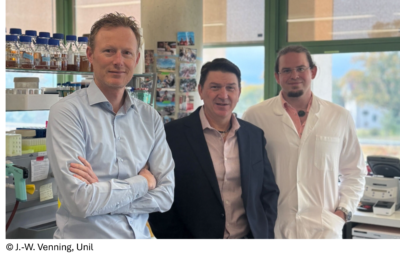The CRISPRi-seq technology, stemming from fundamental research within the team of Professor Jan-Willem Veening at the University of Lausanne, has reached a decisive milestone: it has been licensed to the start-up “i-Seq Biotechnology”. This innovation paves the way for new vaccines against diseases for which there is currently no protection.

It all started with a simple question: why can a bacterium that usually lives harmlessly in our nose sometimes cause severe infections and even death? For several years, the laboratory of Professor Jan-Willem Veening at the Department of fundamental microbiology of Unil’s Faculty of biology and medicine has been studying the pneumococcus (Streptococcus pneumoniae), responsible for hundreds of thousands of deaths worldwide each year.
By studying this pathogen, the microbiologist and his team developed a new technology called CRISPRi-seq. Based on a modified version of the famous CRISPR-Cas9 enzyme, it allows large-scale genetic screenings to identify genes essential for an organism’s survival. Using this technique, the scientists found lafB, a gene crucial for the survival of the pneumococcus.
In collaboration with the Pasteur Institute of Lille, the team tested their discovery in a mouse model simulating human respiratory infections. “We have shown that the protein encoded by this gene, present in all strains of pneumococcus, could be a promising vaccine,” explains Jan-Willem Veening. Unlike the vaccine currently used in Western countries, which targets the capsule of only thirteen variants of the bacterium, the LafB protein could lead to a broad-spectrum vaccine capable of protecting against all existing pneumococcal strains. This significant advancement was published in the scientific journal Cell Host & Microbe in March 2024.
A Start-Up to Bridge the Gap to Industrial Production
To move from the laboratory to practical application, the biologists faced a major challenge: industrial-scale production that meets international standards. “This requires several million francs, specialized infrastructure, and industrial expertise that we did not have,” says Jan-Willem Veening. His team therefore turned to the technology transfer office Knowledge Transfer UNIL CHUV (formerly PACTT), whose mission is to help laboratory discoveries find their way into the industrial world.
Thanks to an information sheet explaining the technology, posted on several platforms, CRISPRi-seq attracted the attention of a US-based investor group specializing in creating businesses from academic life science innovations. In October 2024, the start-up i-Seq Biotechnology was founded in the United States. “The company has an exclusive license to commercially exploit the patent, co-owned by Unil and the Institut Pasteur (Lille), based on this technology,” explains Anne-Renée Leyvraz, Knowledge Transfer Manager, who supported the inventors all along the commercialization process, as well as the license signature, together with lawyer Laura Lo Bello and the Knowledge Transfer UNIL CHUV’s director, Alberto Schena. “Thus, when revenues are generated, both the institutions and the inventors will benefit.”
Towards Universal Vaccines?
In the long term, the new technology could go beyond pneumococcus. “The method we have developed allows us to search for new antigens for other bacteria for which there is currently no vaccine, such as streptococci or staphylococci,” emphasizes Jan-Willem Veening.
The public health stakes are considerable. As antibiotic resistance increases and vaccines remain expensive and sometimes inaccessible in low-income countries, the development of more universal and affordable vaccines represents a major hope. “This is a great example of how fundamental research can, sometimes by chance, lead to a concrete application with a significant impact,” concludes the microbiologist.

